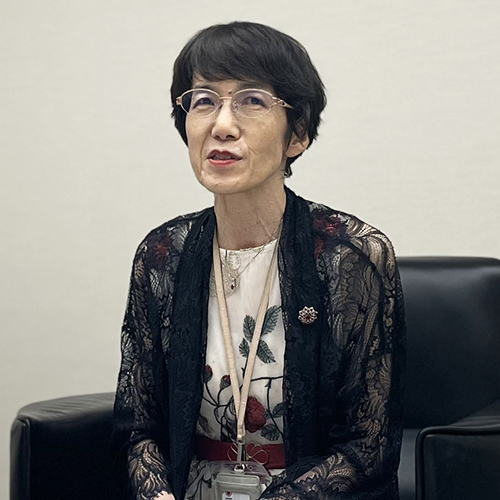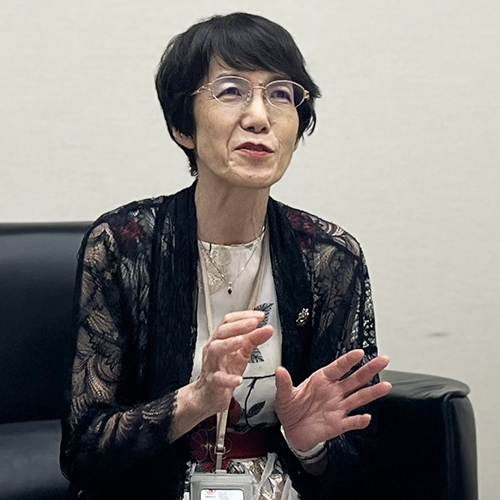Interview
- TOP
- KANSAI Startup Ecosystem
- Open Innovation is Essential for Creating New Businesses
Open Innovation is Essential for Creating New Businesses
The Kansai Economic Federation (Kankeiren) has identified fostering networks between corporations and startups as a key priority. By accelerating the creation of new businesses through open innovation, Kansai can achieve significant economic benefits that contribute not only to the Kansai region but also to Japan's overall growth strategy. Takuko Sawada, Vice Chair of Kankeiren and Chair of its Startup Ecosystem Committee, emphasizes the importance of collaboration, stating, "We hope that the 'Global Startup EXPO 2025' will serve as a catalyst for collaboration between Kansai's corporations and startups and international players."
Key Takeaways from the Article
- Kankeiren is actively working to create growth models tailored to unique strengths of the Kansai region.
- Collaboration between large corporations and deep-tech startups is essential for developing new businesses that address societal challenges through practical implementation.
- Events such as the Osaka/Kansai Expo and the Global Startup EXPO 2025 are expected to foster collaborations among international companies, venture capitalists (VCs), Kansai startups, and large corporations.
Takuko Sawada
Vice Chair of the Kansai Economic Federation and Vice Chair of Shionogi & Co., Ltd. She also serves as Chair of BioCommunity Kansai. A graduate of the Faculty of Agriculture at Kyoto University, she is originally from Hyogo Prefecture.

How does Kankeiren support startups?
"We are accelerating innovations in the Kansai region, leveraging its diverse regional characteristics."
Kankeiren continues to host business matchmaking events for startups and corporations. We organize a pitch event having startups from the outside of the Kansai region—the Hokuriku region last year and Fukushima Prefecture next September—in order that corporations in the Kansai region can expand their business opportunities.
Kansai plays a leading role in regional revitalization and must continue to thrive. However, given the diverse characteristics of each area, it is essential to create unique growth models for different regions. The "Acchi-Kocchi Kansai Innovation Project" is the key initiatives designed to achieve this objective. By leveraging regional resources, Kankeiren collaborates with various areas of Kansai to foster innovation. To date, we are creating business opportunities under cooperation agreements with Maizuru City in Kyoto Prefecture and the Tamba region in Hyogo Prefecture.
Additionally, Kankeiren promotes collaborative activities in partnership with the National Institute of Advanced Industrial Science and Technology (AIST) at “JAM BASE,” the innovation facilities of the redevelopment area “Grand Green Osaka” in Osaka’s Umeda district.
What are the unique characteristics of Kansai's startup ecosystem?
"It is supported by robust infrastructure, including public-private partnership hubs and research and development facilities."
Kansai's startup ecosystem benefits from well-established public-private partnership hubs, as well as research and development facilities like "Nakanoshima Qross," a center for regenerative medicine, and Kyoto Research Park. This fertile environment for startups is further strengthened by initiatives like the Kansai Startup Academia Coalition (KSAC), a network of over 70 organizations from academia, industry, government, and finance, which is led by academia to support entrepreneurs. According to a 2024 survey by the Ministry of Economy, Trade, and Industry on university-based startups, universities in the Kansai region demonstrated notable progress. Unlike Tokyo, which can feel overwhelming due to its vast size and numerous stakeholders, Kansai offers a more cohesive community where stakeholders are aligned and work collaboratively toward common goals.
What is needed to strengthen Kansai's startup ecosystem?
"Large corporations must embrace open innovation to create new businesses."
 While national startup policies have traditionally focused on increasing the number of IPOs, the emphasis is shifting toward enhancing corporate value. In Japan, however, the amount of funding from VCs and corporations remains limited, and relying solely on in-house technologies has proven insufficient. Similarly, large corporations find it increasingly difficult to create new businesses independently. Open innovation—the integration of external technologies and their creative combination—is essential for developing new businesses. To establish a resilient ecosystem for the future, promoting open innovation is more important than ever.
While national startup policies have traditionally focused on increasing the number of IPOs, the emphasis is shifting toward enhancing corporate value. In Japan, however, the amount of funding from VCs and corporations remains limited, and relying solely on in-house technologies has proven insufficient. Similarly, large corporations find it increasingly difficult to create new businesses independently. Open innovation—the integration of external technologies and their creative combination—is essential for developing new businesses. To establish a resilient ecosystem for the future, promoting open innovation is more important than ever.
A key prerequisite for open innovation is transparency regarding the technologies that corporations require. While this can be challenging for many companies, the pharmaceutical industry has been proactive in overcoming these barriers, actively acquiring technologies and innovations from universities and other institutions. Expanding such initiatives across wide range of industries is crucial not only for the growth of startups but also for the advancement of large corporations and other business entities. Kankeiren is committed to supporting these efforts.
Kansai is home to many promising deep tech companies. What challenges do they face?
"The key challenge lies in how to integrate products, such as those developed using diverse biotechnologies, into society."
Kansai plays a pivotal role in hydrogen energy and is gaining attention in nuclear fusion research and quantum computing technology. In the biotechnology field, BioCommunity Kansai (BiocK) is spearheading advancements in "bio-manufacturing," producing a wide range of products such as building materials and resin materials through diverse biotechnologies.
Large corporations are actively seeking new business opportunities that can address future societal challenges. The next step is to collaborate with deep tech startups and university laboratories to integrate these solutions to society. However, successful examples remain limited. While large corporations often have clear goals, they may lack a comprehensive understanding of the components necessary to achieve them. Identifying and addressing these gaps will facilitate better matching and effective collaboration.
What are your expectations for the Osaka/Kansai Expo and the Global Startup EXPO 2025?
"We hope international players will join Kansai's startup ecosystem, strengthening its foundation."
In certain fields, simply publishing intellectual property or presenting research at academic conferences attracts significant international interest. This trend underscores the potential of the Osaka/Kansai Expo and the Global Startup EXPO 2025 as platforms to showcase Kansai's strengths to the world. These events are expected to foster collaborations between international companies, VCs, Kansai startups, and large corporations.
Moreover, the presence of skilled evaluators is essential for nurturing startups. While university-affiliated VCs and corporate entities currently fulfill this role, the involvement of international VCs would add depth to the ecosystem. It is vital for the Global Startup EXPO to evolve into an annual event, cultivating an environment where large corporations, SMEs, and startups can collaborate as equals, united by shared goals.
